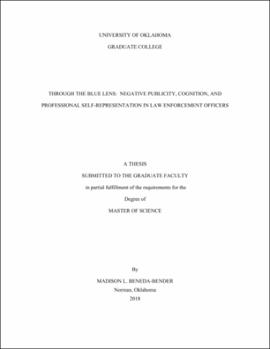| dc.description.abstract | Increased access to digital media has allowed for widespread proliferation of news
coverage. Unfortunately, recent research has demonstrated a variety of acute negative outcomes
associated with exposure to disturbing news content, such as increased negative affect, anxiety,
and stress. Given the large body of literature demonstrating acute cognitive deficits in response
to stressful stimuli, it is possible that exposure to stress-inducing negative media might
negatively impact cognition. While a number of heavily publicized, high-profile negative
interactions between police officers and citizens make this question particularly applicable to law
enforcement samples, little research has addressed whether negative coverage of police activity
result in acute cognitive deficits for officers exposed to such content. To address this gap, 30
veteran police officers completed a cognitive assessment battery both prior to and following
exposure to either negatively-valenced or positively-valenced media clips in order to examine the
effect of media exposure on officers’ performance on basic cognitive tasks. Officers also
completed a series of questionnaires to explore the views that officers hold about themselves, the
public’s perception of police officers, and the media within the context of their occupation.
Results indicated that performance over time was not significantly influenced by exposure to
valenced clips, though there were significant time effects for certain cognitive tests. Despite lack
of acute cognitive decrements, officers did indicate that negative publicity surrounding officer
activity makes it more difficult and dangerous to work in law enforcement. As perception of
danger on the job has been linked to negative affective and behavioral consequences, future
research should further explore connections between negatively valenced coverage of police
activity and other areas of police performance, health, and well-being. | en_US |
